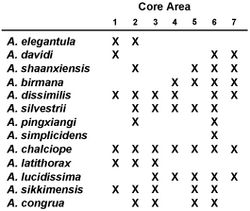Amara simplicidens
| Notice: | This page is derived from the original publication listed below, whose author(s) should always be credited. Further contributors may edit and improve the content of this page and, consequently, need to be credited as well (see page history). Any assessment of factual correctness requires a careful review of the original article as well as of subsequent contributions.
If you are uncertain whether your planned contribution is correct or not, we suggest that you use the associated discussion page instead of editing the page directly. This page should be cited as follows (rationale):
Citation formats to copy and paste
BibTeX: @article{Kavanaugh2014ZooKeys407, RIS/ Endnote: TY - JOUR Wikipedia/ Citizendium: <ref name="Kavanaugh2014ZooKeys407">{{Citation See also the citation download page at the journal. |
Genus: Amara
Name
Amara simplicidens Morawitz, 1863 – Wikispecies link – Pensoft Profile
- Amara (Bradytus) simplicidens Morawitz, 1863b: 60. Type material: 3 syntypes (2 males and 1 female) in ZIN (lectotype not yet designated). Type locality: Japan, Hokkaido, Hakodate.
- Amara (Bradytus) punctatissima Baliani, 1932: 13. Type material: Holotype male, allotype and at least 1 other paratype in MCSNG, 1 paratype in DEI. Type locality: China, Sichuan, Kangding (“Tatsienlu, Grenze O.Tibet”). Synonymized by Hieke (1995[1]: 301).
- Amara (Leiocnemis) marginicollis, Lutshnik, 1915: 130. Type material: Holotype female, originally in Lutshnik collection, but now missing (Hieke 1999a[2]: 171). Type locality: Japan, Harima. Synonymized by Hieke (1999a[2]: 171).
- Amara (Leiocnemis) matsumurae Csiki, 1929: 450, new name for Amara marginicollis Lutshnik, 1915, [nec Morawitz 1863a[3]:259]. Synonymized by Hieke (1999a[2]: 171).
Diagnosis
Adults of this species (Fig. 19) can be distinguished from those of all other species in the region by the following combination of character states: body length 8.3–8.4 mm; dorsal surface dark brown to black, without metallic reflection, at least femora and outer antennomeres dark (piceous to black); elytral microscuplture comprised of distinctly transverse meshes in both males and females (more transverse and less deeply impressed in males than in females); pronotum (Fig. 19a) only slightly narrower anteriorly than basally, anterior margin almost as wide as posterior margin, lateral margins more or less evenly rounded from apical to basal angle, anterior angles slightly projected anteriorly beyond anterior margin, posterior angles sharp, not rounded, outer basal impressions sharply delimited laterally by narrow, slightly oblique raised (but not carinate) areas, pronotal base very coarsely punctate; elytra with parascutellar pore puncture absent; medial protibial spurs simple; metatibia of male with brush-like setae medially in the apical half; tarsomere 5 of hind tarsi with two or (in a few specimens) three pairs of setae ventrally (Fig. 6b); last abdominal sternite of male with one pair (Fig. 5e) and female with two pairs (Fig. 5c) of setiferous punctures near hind margin.
Habitat distribution
Specimens of this species were collected in daytime from under stones on the open bank of a small stream at an elevation of 1740 m and at night on wet stones along a roadside at 1515 m elevation. The only other Amara species members of which were found syntopic with those of Amara simplicidens was Amara lucidissima, with adults of both species found together at the 1740 m site.
Geographical distribution within the Gaoligong Shan
Fig. 19d. We examined a total of 2 specimens (1 male and 1 female) from the following localities: Tengchong County: Datang Village (Maluchong, 25.58194°, 98.67583°, 1740 m, 24 October 2003, H.B. Liang collector [1 male; CAS]); Longchuan Jiang (at Xiangyang Bridge, 25.21056°, 98.58028°, 1515 m, 23 October 2003, H.B. Liang & X.C. Shi collectors [1 female; IOZ]).
This species was recorded only from the western slope of the southern part of the study area (Core Area 6).
Overall geographical distribution
Fig. 27. This species has been recorded from China (Fujian, Heilongjiang, Henan, Hubei, Jiangsu, Jiangxi, Sichuan,Yunnan, and Zhejian Provinces), Japan, North Korea, and Russia (Khabarovsk and Primorsky Kraya, Sakhalinskaya Oblast, and the Kuril Islands). Its occurrence in the study area represents the western limit of its known geographical range.
Taxon Treatment
- Kavanaugh, D; Hieke, F; Liang, H; Dong, D; 2014: Inventory of the carabid beetle fauna of the Gaoligong Mountains, western Yunnan Province, China: species of the tribe Zabrini (Coleoptera, Carabidae) ZooKeys, 407: 55-119. doi
Other References
- ↑ Hieke F (1995) Neue Arten und neue Synonyme in der Gattung Amara Bon. (Coleoptera, Carabidae). Deutsche Entomologische Zeitschrift (N. F. ) 42: 287-328.
- ↑ 2.0 2.1 2.2 Hieke F (1999a) Zwei neue Arten und 22 neue Synonyme in der Gattung Amara Bonelli, 1810 (Coleoptera, Carabidae). Folia Heyrovskyana 7: 151-199.
- ↑ Morawitz A (1863a) Vorläufige Diagnosen neuer Coleopteren aus Südost-Sibirien. Bulletin de l’Academie Imperiale des Sciences de St.-Pétersbourg 5: 231-265.
Images
|






